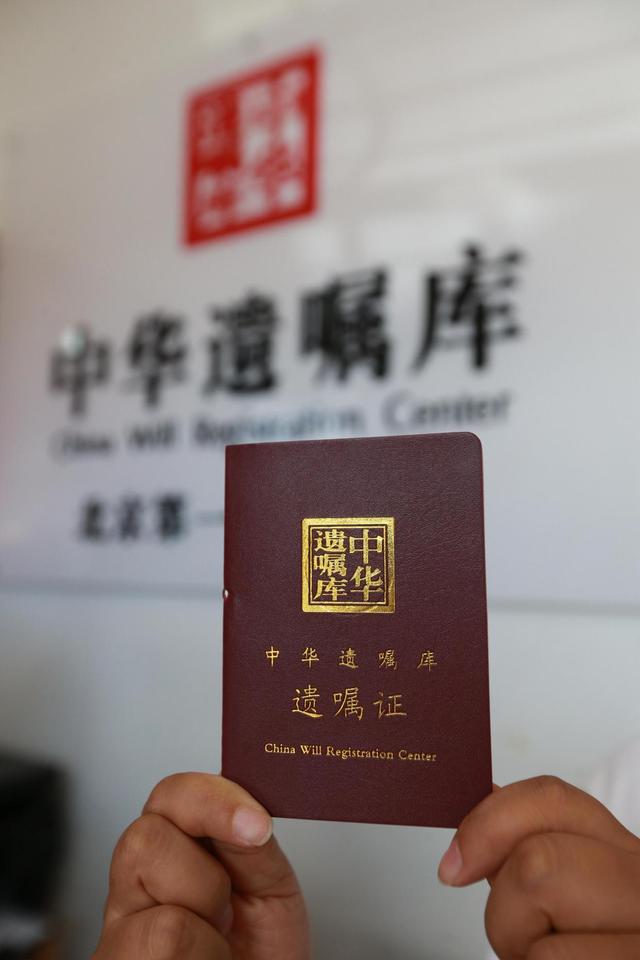Feature: Young urbanites face life's uncertainties by making wills

(Photo/Xinhua)
BEIJING, April 4 -- The electronic screen in the reception area of the China Will Registration Center (CWRC) displays a poignant message for the benefit of visitors: "Don't cry during the video recording, making a will is something joyful."
Eyebrow-raising as it may sound, this advice is very relevant to those customers of all ages who are seeking to control what happens to their wealth after they have departed this earthly plane.
Perhaps more surprising is the rising number of young Chinese people making out their wills these days, along with the standard video message to loved ones. In 2020, the number of people from the post-90s generation making out their wills at the center was 553, a ten-fold increase on the figure for 2017.
In the eyes of Ma Xiaoping, director of the center's second Beijing registration office, the young urbanites come here to make their wills because it allows them some alone time to reflect, free from the distractions of daily life.
"Death is traditionally a taboo subject for Chinese people, let alone making a will while one is still alive. But nowadays, youngsters have grown more open-minded and are keen to plan their lives in advance," Ma said.
When young people sit down for some thorough reflection on what they really own and how it should be distributed, as well as what remains unfinished, they are also offered an escape from their humdrum existence and mounting everyday pressures.
Whether they are in the caring professions or commuters immersed in a hyper-competitive work culture, people appreciate the cruelty and impermanence of life, with its brutal working hours, and this spurs them to buck the traditional taboo on facing death, according to Ma.
"I remember a teenage fan of Kobe Bryant who came to make a will after the basketball star's tragic death last year," Ma added.
Since the center was founded in 2013, more than 190,000 wills have been recorded and stored -- both offline and online -- in the center's far-flung registration and service offices across China.
Currently, young people are mostly leaving their bank deposits, cash, insurance policies, and digital assets, while their pets are often bequeathed to trusted friends and family members. They can also choose to leave a message to be delivered to their loved ones, or else save it for some future occasion a hundred years down the line.
"The wills are kept confidentially during the registrant's lifetime and will come into force thereafter," Ma said.
One Shanghai-based freshman decided to leave her bank deposits of around 20,000 yuan (about 3,047 U.S. dollars) to her friend who had supported and encouraged her through her darkest times.
"It is not an end, but a new start for me. I will strive to lead a better life after my will is made," she said.
Yin Yanxia, 43, who worked as a nurse in Beijing for over two decades, now volunteers at the center, helping people with their queries about making a lawful and thorough will.
"The proper distribution of property of your own free will is something that everyone needs. I've seen too much of birth, aging, sickness and death, and making a will at least helps ease your troubled mind after all the vicissitudes of life," she said.
Almost 80 percent of the young testators have houses bought by their parents in their names, and thus making a will becomes a must to hedge against disputes in case of the youngster's accidental death, according to Tang Tingting, who works at the center.
Last year, following the COVID-19 outbreak, the CWRC also initiated a will-making program on WeChat, enabling clients to open up towards their beloved ones online. However, the online will is more of an emotional outlet than a legal document, and it does not involve the distribution of property.
In 2018, the center connected to a data platform for judicial electronic evidence, making it possible to save the digital version of the wills for future court hearings.
Since China's Civil Code took effect on the first day of 2021, computer-printed wills now have legal force, whereas previously only hand-written documents were accepted. The Civil Code also clarified that, in cases of multiple wills being in existence, the most recent will has the final say, a move that has greatly facilitated the center's work, according to Ma Xiaoping.
"The growing interest of young people in making wills demonstrates a more open-minded and rational social mentality. The idea of making arrangements beforehand to ward off troublesome disputes is gaining ground in the current law-based society," Ma said.
Photos
Related Stories
Copyright © 2021 People's Daily Online. All Rights Reserved.










